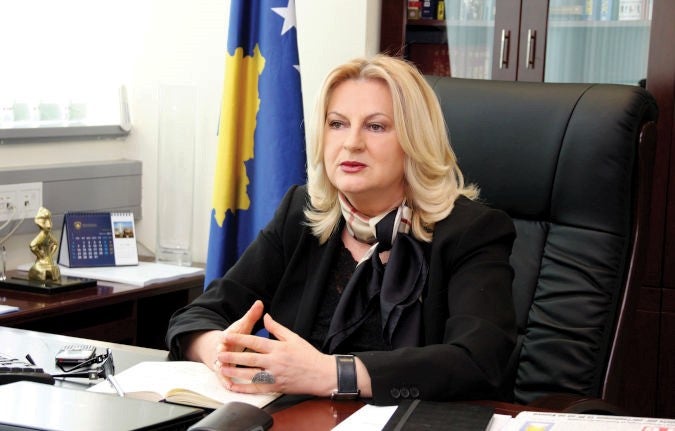Take five: “Time has come for women to have more power”
Date:

The former Deputy Prime Minister of Kosovo[1] and past chief negotiator in the Brussels Dialogue, Edita Tahiri is currently Chair of the Regional Women’s Lobby for Justice Peace and Security in South-Eastern Europe (RWLSEE). A participant at the Fourth World Conference on Women in Beijing in 1995, she witnessed the moment when a visionary agenda for women`s rights was adopted. In this interview, Edita Tahiri discusses women in power and decision-making, an area of concern included in the Beijing Declaration.
In 2020, we will celebrate 25 years since the Beijing Declaration and Platform for Action was adopted. Why was there a need for a women`s rights and gender equality agenda?
The agenda for the empowerment of women and girls adopted in Beijing 25 years ago was a visionary response to persistent gender inequality and the severe under-representation of women in decision-making all over the world. Men’s domination left women marginalized and discriminated in all spheres of life. The world was virtually ‘gender blind’, unable to see that women, as half of the world’s population, were a strategic asset to be invested in for a better future. There was a need for a ground-breaking and eye-opening agenda that would present women, as half of all human capital, equally responsible with men for building a peaceful, stable and prosperous future for all.
What has changed in gender equality and women`s and girls` rights in the last 25 years across the region and your country?
Women’s journey towards empowerment has had mixed results these past 25 years. I am happy to see greater representation of women in national parliaments and local levels, even if it’s through quotas. I am unhappy that women continue to be under-represented in governments at decision-making levels. I am disappointed that women are largely missing in formal peace processes. Most painful is the hidden issue of survivors of conflict-related sexual violence. Women have been outstanding in peacebuilding, democratic governance, reconciliation and advancing the women, peace and security agenda, yet their sufferings in conflict and contributions to peace are not fully recognized. Gender equality and women’s empowerment have made legal progress, but practical implementation lags far behind.
What gender equality and women in decision-making issues should national authorities’ pay attention to?
Inequalities persist, and particularly worrisome is gender inequality. National authorities must act to ensure the equal participation of women in national and local governments so we have sound governance free of corruption. Women should play a key role in deciding on the future of gender-inclusive democratic governance and peacebuilding. Women’s meaningful participation in peacebuilding, at negotiating tables and in security processes can foster peace, stability and prosperity. Only gender-inclusive peace is sustainable. Only 2 per cent of mediators are women, despite the adoption so many years ago of resolution 1325. Equal access to justice and transitional justice for women leads to sustainable peace and reconciliation.
What are your expectations from Beijng+25?
It’s time to advance beyond papers and commitments to action. I believe and expect that Beijing+25 will set a new vision and reinvent the strategy for gender-inclusive peace and sustainable development.
As a gender equality and women`s rights activist, what is your message to the next generation of activists, female and male?
Time has come for women to have more power. Time has come for us to enter the forefront where big decisions are made. We women cannot remain as part of the second or third track processes. We must be in the first track and decide equally and together with men on the future we want.

This story is part of the regional media campaign “12 voices. 12 journeys. 12 women from 12 Europe and Central Asia countries”. Passionate about gender equality and women`s rights, explore aspects of the 12 critical areas of the Beijing Platform for Action: poverty; education and training; health; violence; armed conflict; economy; power and decision-making; institutional mechanisms; human rights; media; environment; and the girl child. On the eve of 2020 and the 25th anniversary of the 1995 Beijing Declaration and Platform for Action, these 12 women are reimagining economies, societies and political systems to achieve gender equality. Imagine a world where gender equality is the norm. These women do.
[1] All references to Kosovo on this website shall be understood to be in full compliance with UN Security Council Resolution 1244 (1999).